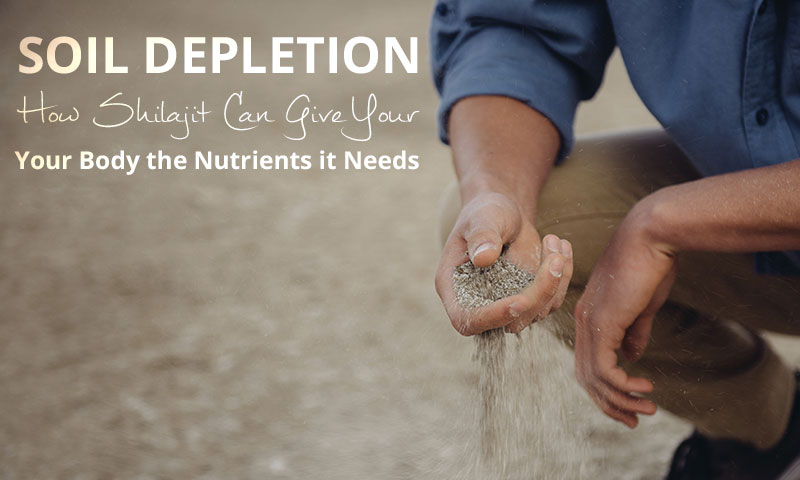Soil Depletion: A Lack of Nutrients, and How Shilajit Can Help

Where do you get the nutrients your body needs for survival and growth? In the past, the nutrients our bodies needed to thrive were found in the foods we ate. As long as you ate a diet rich in fruits, vegetables, and whole grains, your body would get the vitamins and minerals it needs. Today, because of soil depletion, we simply aren’t getting the nutrients we need to thrive. Let’s take a closer look at soil depletion, and learn how shilajit can help.
The Lack of Vitamins & Minerals
You may be eating your fruits and vegetables religiously, but you won’t get as many nutrients as your body needs to be healthy. According to experts with Scientific American, “fruits and vegetables grown decades ago were much richer in vitamins and minerals than the varieties most of us get today.” According to the Office of Disease Prevention and Health Promotion, it was found that iron, vitamin A, vitamin D, Vitamin E, folate, calcium, magnesium, vitamin C, potassium, and fiber are all under-consumed by varying groups of people in the United States. (Source) So, where is the problem? Why is our food lacking nutrients?
“We would have to eat eight oranges today to derive the same amount of Vitamin A as our grandparents would have gotten from one.” (Source)
Soil Depletion Due to Modern Agricultural Practices
In the quest to become more efficient in growing crops, nutrients have been stripped from the soil. Modern intensive agricultural methods mean we have pest-resistant and fast-growing foods, but they have stripped nutrients from our soil. A study was completed by a team of researchers at the University of Texas. Their findings were published in the Journal of the American College of Nutrition. It was found that the vitamins in 43 different vegetables (when compared with the nutrients in the same vegetables from 1950) had declined. Their conclusion was that decline is due to the agricultural practices in use today: Namely, that crops are grown not for nutrition, but for appearance, size, and the ability to resist pests. “Efforts to breed new varieties of crops that provide greater yield, pest resistance and climate adaptability have allowed crops to grow bigger and more rapidly….but their ability to manufacture or uptake nutrients as not kept pace with their rapid growth.”
“Average calcium levels in 12 fresh vegetables dropped 27 percent; iron levels 37 percent; vitamin A levels 21 percent, and vitamin C levels 30 percent.”(Source)
What to Do? Eat Better Food, and Take Shilajit
You may want to throw up your hands in despair, but there is hope. Take steps to eat better food: buy organic products, grow your own vegetables and fruits, and take a supplement like shilajit to get the vitamins and minerals you need to be healthy. Shilajit is rich in minerals and vitamins, and it has an added benefit: Its high fulvic acid content pushes nutrients directly into your cells, ultimately helping your body absorb the nutrients it does get. Take control of your health, and make sure your body is getting the fuel it needs to thrive: Order shilajit today!









